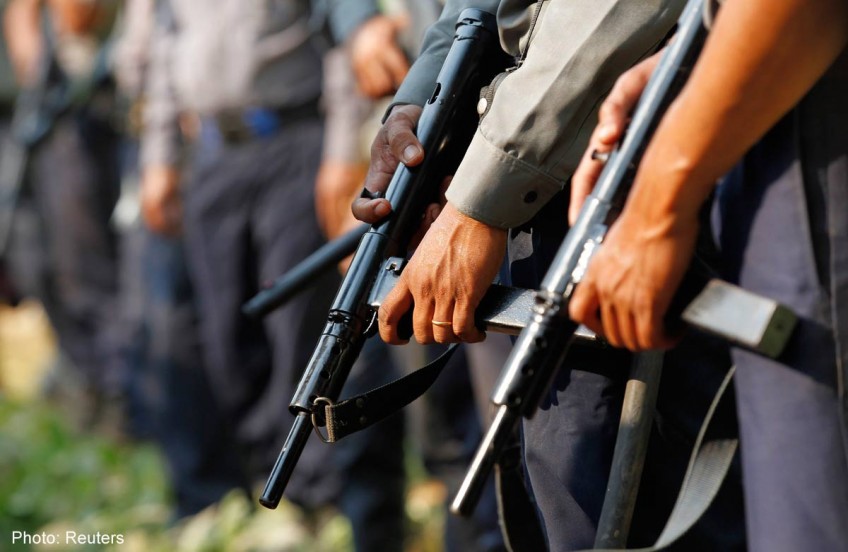Myanmar border conflict riles heavyweight neighbour China

YANGON - Bloody conflict in a remote corner of northern Myanmar has spilled violently across the border with China, risking a rift with the mighty neighbour and threatening peace efforts with an array of rebels.
Myanmar's army is battling ethnic-Chinese rebels in the Kokang region of Shan state, with aerial bombardments and close-quarter combat, just as the quasi-civilian government is grappling to end decades of border insurgencies in fresh ceasefire talks that began Tuesday.
China mobilised fighter jets after a bomb apparently from a Myanmar warplane landed in a sugar plantation in Chinese territory on Friday, killing five Chinese farm workers.
The incident marked an "astounding" breach in relations between the two long-term allies, said Yun Sun from the Stimson Center's East Asia Program.
He said it was the "worst security incident" since Beijing's embassy in Myanmar was attacked in 1967 during an anti-Chinese riot, although he believes the border unrest will remain contained for now.
Tens of thousands of refugees have fled into China's Yunnan province since fighting in Kokang first flared up in early February.
Mountainous Kokang is known for its strong bonds with China - local people speak a Chinese dialect and China's yuan is the common currency and the conflict has tapped into long-standing nervousness in Myanmar about its giant northern neighbour.
Kokang's rebel Myanmar National Democratic Alliance Army is led by shadowy octogenarian commander Phone Kya Shin, and the group is accused by the government of being enmeshed in drug trafficking.
Officials have also accused Yunnan provincial authorities of helping the rebels, who were previously driven out of Kokang in a bloody push by the army in 2009.
"Anti-Chinese sentiment has re-emerged strongly" in Myanmar, said Elliot Brennan, from the Institute for Security and Development Policy.
He said this was of "grave concern" to Beijing, which has to contend with public anger of its own over the deaths of the five Chinese.
China acted as an economic and political shield for Myanmar for decades, when the country was under military rule and the junta isolated by the West.
Its reward was a wealth of sometimes controversial investments - particularly in dams, mines and energy infrastructure.
But as Myanmar has begun to reform and open up it has sought to reduce that dependence, sometimes to Beijing's irritation - it called for the rights of Chinese companies to be protected after a huge dam project was suspended.
China has vowed not to allow rebels to use its territory and scolded Myanmar over the escalation of border tensions.
Risk of contagion
Myanmar state media are portraying the Kokang conflict as a "just war" against "renegades", burnishing the army's image after it was tarnished by a litany of rights abuses from its decades in power.
But experts say hardening pro-military sentiment as well as the participation of other ethnic groups in the clashes - particularly those involved in faltering peace talks - raises the possibility that the unrest could spread.
"The risk of contagion of this conflict to others is quite high," said independent analyst Richard Horsey, adding current public support for the military was "unprecedented".
Minor celebrities and even some democracy activists have joined the chorus of support for the military, while many social media users have changed their profile pictures to the logo of the regional army command fighting in the area.
This swell of support for the army is seen as an ominous signal that the general public could lose patience with the country's lengthy peace process.
Myanmar's many ethnic minorities have fought for greater political autonomy over decades of civil wars, fuelled in part by tussles over the kind of natural resources that China is eager to exploit through its investments.
The government that replaced outright military rule in 2011 prioritised a nationwide ceasefire in its reforms, but talks have been slow-going amid lingering distrust of the army and continued clashes, particularly in northern Kachin.
The insurgent Kachin Independence Army is now taking part in the peace process for the first time in months, and has denied it is covertly helping the Kokang.
For its part, China has urged both the Myanmar government and Kokang rebels "to exercise restraint, cool down the situation and realise peace and stability as soon as possible".
But Horsey noted: "The government has ruled out negotiation with what it sees as an illegitimate aggressor force, and this position is unlikely to change any time soon."